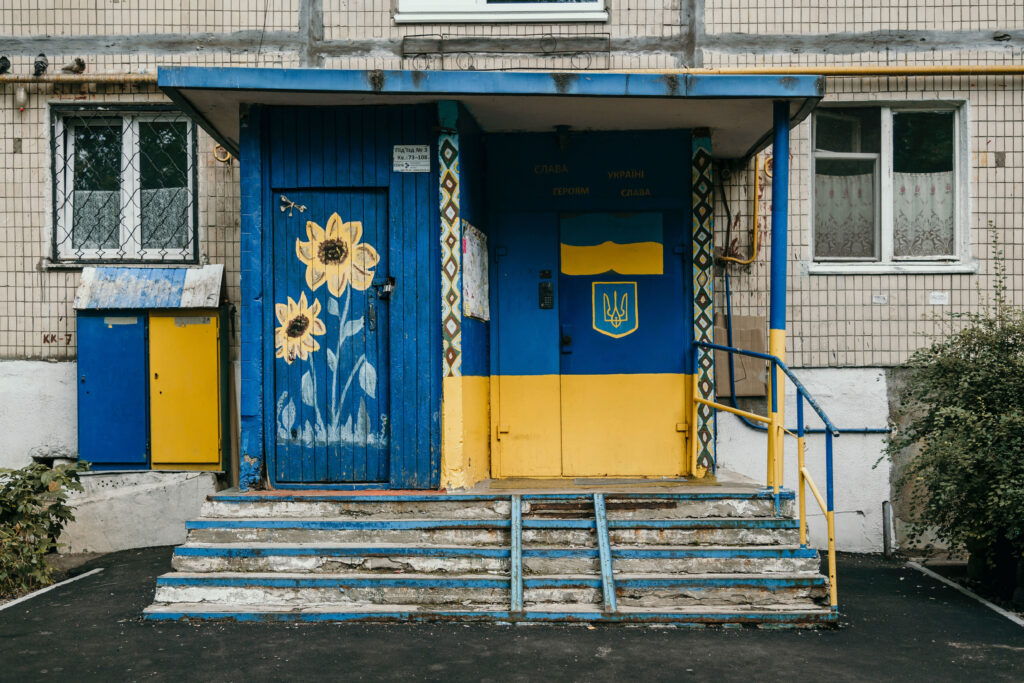Volcanoes are erupting in The Philippines, but on-fire Australia received some welcome rain. The Iran war cries have been called off and The Donald’s military powers are about to be hamstrung by the Senate. Meanwhile, his impeachment trial is starting, and we’re all on Twitter for a front-row seat.
Fighting with the Ukrainian Language
Six months into Russia's invasion, interest in the Ukrainian language is still soaring. Speaking and learning it is everything from a show of resistance within Ukraine to a way of welcoming refugees outside of it.

The Ukrainian language has endured centuries of repression, including outright bans by Imperial Russia and political persecution in the Union of Soviet Socialist Republics (USSR). Now, in the wake of Russia’s full-scale invasion of Ukraine, international interest in learning the language has surged.
Last week marked six months since Russia invaded Ukraine, and the toll has been heavy. Exact figures remain difficult to confirm, but civilian deaths are believed to be in the tens of thousands, more than 13 million people have been displaced, and some 6.6 million refugees have fled the country. Around 9,000 Ukrainian soldiers and 25,000 Russian ones are said to have been killed.
Amid these devastating losses, the rising global prominence of the Ukrainian language is a slim silver lining.
In the first month of the full scale invasion, the number of users studying Ukrainian on popular language-learning app Duolingo increased by 577%. Meanwhile, language classes across the United States and Europe—many freshly launched—have seen spikes in enrollment.
Dr. Maryna Kapas-Romaniuk, a refugee from Kyiv and a long-time language teacher, is one of the educators supporting this surging interest in Ukrainian. Prior to the Russian invasion, she was an assistant professor at Taras Shevchenko National University in Kyiv. In the wake of the war, she sought refuge with her young son in York, England, where she is currently teaching two new Ukrainian courses at the University of York. Her students include families hosting refugees in their homes.
Dr. Kapas-Romaniuk takes her job very seriously. “In this war, every Ukrainian is a fighter in their own way. As a teacher, I sometimes feel like a soldier, because for me, teaching Ukrainian is a way to help Ukraine.” She has been teaching Ukrainian for over ten years, but her pedagogy has shifted somewhat post-invasion. “Every lesson, I try to highlight our identity and our pain,” she says. “But I also always put jokes into my lessons because—even in wartime—Ukrainians try to joke all the time.”
Ukrainian has historically faced an uphill battle for survival. Linguists believe that its precursor, Old East Slavic, split into the unique languages of Ukrainian, Belarusian, and Russian toward the end of the 1300s. Since then, battles for territory have frequently coincided with battles for linguistic control. After the lands of Ukraine were absorbed into Imperial Russia in the eighteenth century, the Tsarist government actively discouraged the development of Ukrainian as a unique language. Ukraine was referred to as Little Russia, and its language was called Little Russian—tropes that Russian President Vladimir Putin repeatedly recycles in his present-day speeches.
The USSR, especially in the Stalin-era, was also a tough place for the Ukrainian language, according to Professor Oxana Shevel, Associate Professor of Political Science at Tufts University and President of the American Association for Ukrainian Studies. In the USSR, there was a “constant tug of war” between stated ideals of individual national development and the “practical reality” that Russian was the essential language for social participation and advancement. While Ukrainian was still taught in schools and permitted for cultural activities, its usage was often viewed with suspicion in professional and social spheres.
Professor Shevel studied at Kyiv State University on the eve of the USSR’s collapse. Anecdotally, she recalls just one student who spoke Ukrainian socially. “More than once, she was actually called into the KGB office and asked why she insisted on speaking Ukrainian in the corridors.”
After Ukraine regained its independence in 1991, Ukrainian became the country’s sole official language. Nevertheless, the shift from Russian was not immediate. “Unfortunately, many people had internalized the stereotype that Ukrainian was somehow backwards,” says Professor Shevel. In recent decades, successive governments have enacted various policies intended to elevate the status of Ukrainian, including mandating it as the primary language of the education system.
Interest in Ukrainian, especially among the younger generation, spiked after the 2013–14 Maidan Protests and 2014 Revolution of Dignity, which saw hundreds of thousands of protesters take to Kyiv’s Maidan Square to protest pro-Russian President Viktor Yanukovych, an ally of Putin. The mass protests were prompted by Yanukovych’s decision to renege on a deal to establish stronger economic ties between Ukraine and the European Union (EU), instead pursuing closer ties to Russia. In February 2014, deadly clashes between protesters and security forces in Kyiv culminated in the ousting of Yanukovych. In the wake of this movement, termed the Revolution of Dignity, Russia annexed Crimea—a Black Sea peninsula internationally recognized as part of Ukraine—and backed pro-Russian separatists in the Donbas, a region of eastern Ukraine. This sparked an ongoing war which, even prior to the full-scale invasion in February 2022, had claimed more than 14,000 lives.
Anna Ohoiko was among the throngs of protesters that took to Kyiv’s Maidan Square in 2013 and 2014. She had initially planned to work as an English teacher, but the Revolution of Dignity, which coincided with her graduation, inspired her to reconsider her career path. Frustrated with the continual conflation of Ukraine and Russia, and eager to encourage the world to recognize Ukraine as an independent nation with its own culture, Ohoiko decided to dedicate herself to promoting her language.
She went from setting up a Facebook page for Ukrainian learners to launching her own website, UkrainianLessons.com, as well as two podcasts, Ukrainian Lessons Podcast and Five-Minute Ukrainian. To date, she has released more than 200 episodes—striving to counter a lack of Ukrainian language-learning materials.
Since the outbreak of the war, Ohoiko has seen a fourfold increase in website visitors and podcast downloads. “There was an immediate boost of interest and motivation,” she says. “Many people say they’ve been trying to learn for years, but there was always something that came up. Now, there’s no excuse.”
Within Ukraine, the shift from Russian to Ukrainian has also rapidly accelerated. Nowadays, numerous Ukrainians are deliberately rejecting Russian and prioritizing Ukrainian in everyday life. In the western city of Lviv, displaced Ukrainians from the predominantly Russian-speaking East have signed up en masse for Ukrainian classes.
This shift is also occurring on the international level—and some think it’s long overdue. In the past, many writers and researchers commenting on Ukraine have neglected to learn Ukrainian, instead relying exclusively on Russian to analyze media and communicate with sources. Dr. Yuri Shevchuk, Senior Lecturer at Columbia University, believes that this betrays both misguided and colonial attitudes. “Would a reader trust a commentator on things American or British who has no command of English?” he asks. “Or on things Spanish, Mexican, or Colombian who has no command of Spanish?”
Dr. Shevchuk has been teaching Ukrainian in the US for more than 30 years. In his decades of experience, attitudes toward studying Ukrainian have fluctuated. Political upheavals, such as the advent of Ukrainian independence in 1991 and the 2014 Revolution of Dignity, caused temporary spikes in student enrollments, but these spikes generally failed to translate into consistent interest. Dr. Shevchuk hopes that this time will be different. “Today with the all-out Russian aggression, when the masks are off, and the Kremlin . . . has openly proclaimed the destruction of the Ukrainian language and culture . . . support for the Ukrainian language and its study have become moral imperatives—a form of resistance to evil.”
There are “early indicators” of a positive shift, he says. Dr. Shevchuk himself has received an influx of inquiries about opportunities to learn Ukrainian. He also highlights recent spikes in sales of popular textbooks. This spring, his own textbook, Beginner’s Ukrainian with an Interactive Online Workbook, reached the top 100 foreign language textbooks on Amazon US.
He’s not alone in his optimism.
Marta Jenkala was born in London, the daughter of refugees who fled Ukraine in the wake of the Second World War. In her household, Ukrainian language and culture was always emphasized: “We lived as full a Ukrainian life as possible in the diaspora.”
Jenkala has been teaching Ukrainian in the United Kingdom since the 1970s. For a long time, she taught on a voluntary basis—primarily for “patriotic reasons”—at Ukrainian Saturday Schools and at the Ukrainian Institute. Since 1999, she has taught Ukrainian part-time at University College London, and between 2006 and 2018, she established and led Ukrainian language classes at Cambridge University.
She, too, has noticed a change. “Suddenly, people in the West have been faced with reality. Everyone can see what’s happening in Ukraine . . . and there’s no longer any ambiguity over whether Ukrainians are the same as Russians.” On the whole, she’s positive about emerging trends. Notably, the Open University—a UK-based distance-learning university—is planning to launch an introductory Ukrainian course in September. The course is specifically designed to provide practical language skills for those seeking to support Ukrainian refugees, and Jenkala hopes that this course will be just the first step on students’ language learning journeys.
Language has long been a particular flashpoint of the war between Russia and Ukraine. The Kremlin has repeatedly justified its aggression by claiming, without evidence, that Russian speakers in Ukraine are facing persecution. Meanwhile, Putin has repeatedly undermined Ukraine’s unique language and culture. As a result, language and identity have become profoundly intertwined for many Ukrainians, the Ukrainian language becoming simultaneously a connection to home, a show of resistance, and an affirmation of individuality and endurance. For international learners, studying Ukrainian can serve as an act of solidarity, a pathway to humanitarian aid, and a step towards decolonization.
Ultimately, language is a cultural weapon. For refugee and teacher Dr. Maryna Kapas-Romaniuk, “Ukrainian is a language of freedom, liberty, and survival.”


